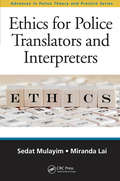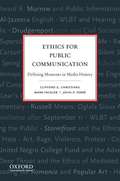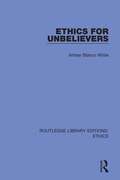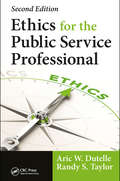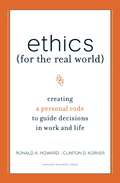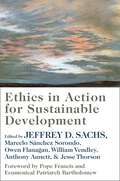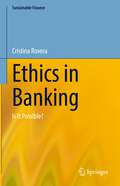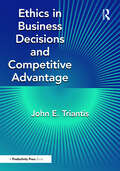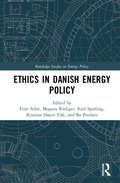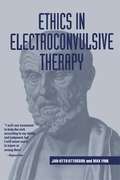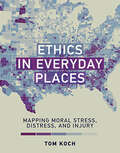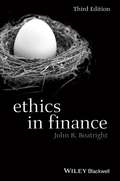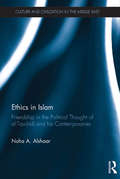- Table View
- List View
Ethics for Police Translators and Interpreters (Advances in Police Theory and Practice)
by Sedat Mulayim Miranda LaiThis book examines the major theoretical foundations of ethics, before zooming in on definitions of professional practice and applied professional ethics, as distinct from private morals, in general and then focusing on professional ethics for translators and interpreters in police and legal settings. The book concludes with a chapter that offers a model for ethical decision making in the profession.
Ethics for Psychotherapists and Counselors: A Proactive Approach
by Sharon K. Anderson Mitchell M. HandelsmanEthics for Psychotherapists and Counselors utilizes positive discussions accompanied by a variety of thought-provoking exercises, case scenarios, and writing assignments to introduce readers to all the major ethical issues in psychotherapy. First book designed to engage students and psychotherapists in the process of developing a professional identity that integrates their personal values with the ethics and traditions of their discipline Authors take a positive and proactive approach that encourages readers to go beyond following the rules and to strive for ethical excellence Utilizes a variety of thought-provoking exercises, case scenarios, and writing assignments Authors present examples from their own backgrounds to help clarify the issues discussed Text emphasizes awareness of one’s own ethical, personal, and cultural backgrounds and how these apply to one’s clinical practice
Ethics for Public Communication: Defining Moments in Media History
by Clifford G. Christians; Mark Fackler; John P. FerreFocusing on one historic episode per chapter, Ethics for Public Communication is divided into three parts, each dedicated to one of the three major functions of the media within democratic societies: news, persuasion, and entertainment. Authors Clifford Christians, Mark Fackler, and John Ferré, three trusted scholars in the field, discuss media ethics from a communicative perspective, setting the book apart from other texts in the market that simply combine journalism with libertarian theory. Classic media ethics cases, like the publication of Rachel Carson's 1962 book Silent Spring, are covered in tandem with such contemporary cases as the creation of Al-Jazeera English and the controversy surrounding Ice-T's protest song, "Cop Killer."
Ethics for Unbelievers
by Amber Blanco WhiteOriginally published in 1949, this book examines the problems of morals in the light of science and philosophy and is addressed to those who do not accept revelation as the sanction for morality. The book discusses the individual, and in particular the origin and nature of conscience as well as society and communal codes of behaviour.
Ethics for a Brave New World (2nd Edition)
by Paul D. Feinberg John S. FeinbergThis updated and revised second edition analyzes the current literature regarding various ethical issues. It includes a new chapter on stem cell research and expanded material on other topics.
Ethics for a Digital Era
by Edward H. Spence Deni Elliott"Elliott and Spence have produced a tight, teachable, and timely primer on media ethics for users and creators of information in the digital age. Pitched at just the right depth of detail to provide a big picture contextualization of changing media practices grounded in concerns for democracy and the public good, the book explores and reflects the implications of the convergence of the Fourth and Fifth Estates with an open-access, hyper-linked architecture which invites self-reflective practice on the part of its users. " --Philip Gordon, Utah Valley University The rapid and ongoing evolution of digital technologies has transformed the way the world communicates and digests information. Fueled by a 24-hour news cycle and post-truth politics, media consumption and the technologies that drive it have become more influential in shaping public opinion, and it has become more imperative than ever to examine their social and ethical consequences. Ethics for a Digital Era provides a penetrating analysis of the ethical issues that have emerged as the digital revolution progresses, including journalistic practices that impact on the truth, reliability, and trustworthiness of communicating information. The volume explores new methods and models for ethical inquiry in a digital world, and maps out guidelines for web-based news producers and users to conceptualize ethical issues and analyze ethically questionable acts. In each of three thematic sections, Deni Elliott and Edward H. Spence reflect upon shifts in media ethics as contemporary mass communication combines traditional analog practices with new forms like blogs, vlogs, podcasts, and social media posts, and evolves into an interactive medium with users who both produce and consume the news. Later chapters apply a process of normative decision-making to some of the most important issues which arise in these interactions, and encourage users to bridge their own thinking between the virtual and physical worlds of information and its communication. Timely and thought-provoking, Ethics for a Digital Era is an invaluable resource for undergraduate and graduate students in media and mass communication, applied ethics, and journalism, as well as general readers interested in the ethical impact of their media consumption.
Ethics for the Public Service Professional
by Aric W. Dutelle Randy S. TaylorHeadlines of public service corruption scandals are painful reminders of the need for continuing education in the subjects of ethics and integrity. Public service professionals employed as government officials, forensic scientists, investigators, first responders, and those within the legal and justice systems, face daily decisions that can mean the difference between life or death and freedom or imprisonment. Sometimes, such decisions can present ethical dilemmas even to the most seasoned of professionals. Building on the success of the first edition, Ethics for the Public Service Professional, Second Edition serves as a single-source resource for the topic of ethics and ethical decision making as it relates to government service. While incorporating an examination of the history of ethics, codes and legislation, the book exposes the reader to the challenges faced by today’s public service professionals and administrators in incorporating ethics within daily decisions, procedures, and duties. Key features include: Current controversies in police, forensic, and other public service sectors including: racial profiling, evidence tampering, disaster response, and audits Important new mechanisms of accountability, including use-of-force reporting, citizen complaint procedures, and open government Contemporary news stories throughout the book introduce the reader to a broad range of ethical issues facing leaders within the public service workplace Chapter pedagogy including key terms, learning objectives, end-of-chapter questions, a variety of boxed ethical case examples, and references Ripped from the Headlines current event examples demonstrate actual scenarios involving the issues discussed within each chapter This in-depth text will be essential for the foundational development and explanation of protocols used within a successful organization. As such, Ethics for the Public Service Professional, Second Edition will help introduce ethics and ethical decision-making to both those new to the realm of forensic science, criminal justice, and emergency services and those already working in the field.
Ethics for the Real World
by Clinton D. Korver Bill Birchard Ronald A. HowardWe often make small ethical compromises for "good" reasons: We lie to a customer because our boss asked us to. We exaggerate our accomplishments on our résumé to get an interview. Temptation blindsides us. And we make snap decisions we regret.Minor ethical lapses can seem harmless, but they instill in us a hard-to-break habit of distorted thinking. Rationalizations drown out our inner voice, and we make up the rules as we go. We lose control of our decisions, fall victim to the temptations and pressures of our situations, taint our characters, and sour business and personal relationships.In Ethics for the Real World, Ronald Howard and Clinton Korver explain how to master the art of ethical decision making by:Identifying potential compromises in your own lifeApplying distinctions to clarify your ethical thinkingCommitting in advance to ethical principlesGenerating creative alternatives to resolve dilemmasPacked with real-life examples, this book gives you practical advice to respond skillfully to life's inevitable ethical challenges. Not only can you make right decisions, you can acquire new habits that will realize the best in yourself and transform your relationships.
Ethics in Action for Sustainable Development
by Sachs, Jeffrey D.; Sorondo, Marcelo Sánchez; Flanagan, Owen; Vendley, William; Annett, Anthony; Thorson, JesseThe Sustainable Development Goals, adopted by the United Nations in 2015, comprise an ambitious and sweeping agenda that unites economic, social, and environmental aims. What resources do the world’s religious and secular traditions offer in support of these objectives? Which principles do these traditions hold in common, and how can these shared values help advance global goals?This book presents an in-depth and deeply engaged conversation among interfaith religious leaders and interdisciplinary scholars and practitioners in pursuit of an ethical consensus that could ground sustainable development efforts. Drawing on more than two years of close-knit discussions convened by Jeffrey D. Sachs and Marcelo Sánchez Sorondo, it offers an extensive and inclusive vision of how to promote human flourishing. The book features theological, philosophical, and ethical deliberations of great diversity and depth on the challenges of sustainable development, addressing questions of poverty, environmental justice, peace, conflict, and the future of work. It includes consensus statements on the moral imperatives of sustainable development, introductions to seven major religious traditions and their conceptions of the common good, and thematic reflections. Wide-ranging and urgent, this book represents a major contribution to interreligious dialogue and to the articulation of a shared global ethics.The book features a foreword by Pope Francis and Ecumenical Patriarch Bartholomew.
Ethics in Advertising: Making the case for doing the right thing
by Wally SnyderThis book provides students and practitioners with a comprehensive overview of the rules and principles associated with ethical advertising practices. With extensive research, and a variety of case studies, and expert opinions, it discusses why advertising ethics is important both to the consumer and the professional. The author presents the rules of ethical conduct recommended by the Institute for Advertising Ethics and demonstrates how these are applied in practice, examining why ethics is important; what the ethical dilemmas the industry faces are; and how to motivate better practices among professionals. The book uses real life stories of "native advertising," marketing to children, and diversity in advertising to show how professionals can be inspired to "do the right thing" for consumers and their companies. Readers will learn how they can solve ethical dilemmas to their personal satisfaction in the competitive work environment. This balanced perspective to the ethical issues that arise in the advertising industry is sure to resonate with students of advertising and marketing.
Ethics in Banking: Is It Possible? (Sustainable Finance)
by Cristina RoveraBanks are frequently considered usurers. Is it possible to talk about ethics when you analyse banking activity? This book focuses on this question and starts with the history and the philosophy. Philosophers like Aristotle, Immanuel Kant and John Stuart Mill proposed different theories about the need for ethics in finance. If we accept Mill's thought, the production of wealth in society is driven by the personal pursuit of profit. But - unfortunately - this does not, on its own, ensure collective well-being. It must be guided by a superior mechanism which transforms it into wealth for all. This introduces the role of financial institutions, which often have to comply with legal obligations. The book focuses on the role that these institutions have in supporting the ‘ethical’ use of money. The author analyses a number of cases in banks and the financial industry and discusses topics like anti-money laundering, anti-usury, islamic finance, microcredit and bank rescue systems, including not only best practices but also examples of unethical financial management.
Ethics in Biodiversity Conservation (Routledge Studies in Conservation and the Environment)
by Patrik BaardThis book examines the role of ethics and philosophy in biodiversity conservation. The objective of this book is two-fold: on the one hand it offers a detailed and systematic account of central normative concepts often used, but rarely explicated nor justified, within conservation biology. Such concepts include ‘values’ (both intrinsic, instrumental, and, more recently, relational), ‘rights’, and ‘duties’. The second objective is to emphasize to environmental philosophers and applied ethicists the many interesting decision-making challenges of biodiversity conservation. The book argues that a nuanced account of instrumental values provides a powerful tool for reasoning about the values of biodiversity. It also scrutinizes relational values, the concept of rights of nature, and risk, and show how moral philosophy proves indispensable for these concepts. Consequently, it engages with recent suggestions on normative aspects of biodiversity conservation, and show the need for moral philosophy in biodiversity conservation. The overriding aim of this book is to provide conservation biologists and policy-makers with a systematic overview of concepts and assessments of the reasons for reaching prescriptive conclusions about biodiversity conservation. This will prove instrumental in clarifying the role of applied ethics and a refined understanding of the tools it can provide. This title will be of interest to students and scholars of conservation biology, conservation policy, environmental ethics and environmental philosophy.
Ethics in Business Decisions and Competitive Advantage
by John E. TriantisBusiness ethics is the set of practices and policies that companies use to guide them through decisions about finances, negotiations and deals, corporate social responsibility, and more. Without a strong set of ethics, a business can run afoul of the law and encounter financial pitfalls and moral dilemmas. The objective of this book is a practical, fair, balanced, and objective treatment of the role of ethics in the business performance of companies in competitive markets that demonstrates how ethics affects business culture, strategy, decision-making, and value creation, which then determine competitiveness and business viability. The universality of corruption and the prevalence of unethical conduct is the background from which the narrative describes how ethical issues enter all functional areas. The ethics’ effects on the complexity of decisions and challenges are examined and the questions of why bother with ethical business and whether businesses invite government regulation are answered. Next, a framework is developed to identify and trace links and influences of business ethics on strategic decisions, corporate culture, and decision-making. The effects of strategy and culture on key business success factors and their interdependence are reviewed along with those with competitive advantage elements. These assessments then form the basis of characterizing competitive advantage in the framework developed. Decision-making and strategy links with competitive advantage elements and the inter-competitive advantage element interactions are evaluated along with competitive advantage organizational effects. The uniqueness of this book is the creation of a method to identify and assess how ethics impacts business decisions and competitive advantage based on accepted economic tenants. It lays the plan for quantitative assessments of the impact of ethical behavior, and it is written from the perspective of a business economist. Other books deal with business ethics elements only; none explains how ethics’ effects permeate business sustainability. The main contribution of this book is demonstrating that ethics is a necessary factor for business sustainability. It provides insights to regulators at all government levels, counterbalances ethicist claims about business ethics, and points out how ethical business conduct affects the economy.
Ethics in Computing, Science, and Engineering: A Student’s Guide to Doing Things Right
by Barry G. BlundellThis comprehensive textbook introduces students to the wide-ranging responsibilities of computing, science and engineering professionals by laying strong transdisciplinary foundations and by highlighting ethical issues that may arise during their careers. The work is well illustrated, and makes extensive use of both activities, and ethical dilemmas which are designed to stimulate reader engagement. A number of memorable case studies are also included and frequently draw on the demanding aerospace industry. The book adopts a strongly human centric approach, with matters such as privacy erosion and censorship being viewed not only in their current context but also in terms of their ongoing evolution. What are our individual ethical responsibilities for ensuring that we do not develop for future generations a technological leviathan with the potential to create a dystopian world? A broad range of technologies and techniques are introduced and are examined within an ethical framework. These include biometrics, surveillance systems (including facial recognition), radio frequency identification devices, drone technologies, the Internet of Things, and robotic systems. The application and potential societal ramifications of such systems are examined in some detail and this is intended to support the reader in gaining a clear insight into our current direction of travel. Importantly, the author asks whether we can afford to allow ongoing developments to be primarily driven by market forces, or whether a more cautious approach is needed. Further chapters examine the benefits that are associated with ethical leadership, environmental issues relating to the technology product lifecycle (from inception to e-waste), ethical considerations in research (including medical experimentation involving both humans and animals), and the need to develop educational programs which will better prepare students for the needs of a much more fluid employment landscape. The final chapter introduces a structured approach to ethical issue resolution, providing a valuable, long-term source of reference. In addition it emphasises the ethical responsibilities of the professional, and considers issues that can arise when we endeavour to effect ethically sound change within organisations. Examples are provided which highlight the possible ramifications of exercising ethical valour. The author has thus created an extensively referenced textbook that catalyses student interest, is internationally relevant, and which is multicultural in both its scope and outlook.
Ethics in Danish Energy Policy (Routledge Studies in Energy Policy)
by Bo Poulsen Finn Arler Mogens Rüdiger Karl Sperling Kristian Høyer ToftThis book deepens our understanding of ethical drivers in energy policy and contributes to future decision-making on transitions towards a sustainable energy system. During the latest fifty years Western energy politics have been faced with a series of ethical challenges including rapid growth, oil crises, security of supply, nuclear power and climate change. Combining philosophical, historical and planning approaches into one narrative, these dilemmas are explored using Denmark as the key case study. Drawing on contributions from several experts in the field, the ethics of energy is investigated from multiple perspectives at the individual, corporate, local and national levels, focusing on concrete decisions where different ethical considerations are weighted against each other. This comprehensive approach helps to gain a deeper understanding of the energy sector’s history and gives important input to its future layout. Drawing comparisons with European and global examples, this book will be of great interest to students and scholars of energy politics and policy, environmental ethics, climate change and sustainability transitions.
Ethics in Early China
by Chris FraserEarly Chinese ethics has attracted increasing scholarly and social attention in recent years, as the virtue ethics movement in Western philosophy sparked renewed interest in Confucianism and Daoism. Meanwhile, intellectuals and social commentators throughout greater China have looked to the Chinese ethical tradition for resources to evaluate the role of traditional cultural values in the contemporary world. Publications on early Chinese ethics have tended to focus uncritical attention toward Confucianism, while neglecting Daoism, Mohism, and shared features of Chinese moral psychology. This book aims to rectify this imbalance with provocative interpretations of classical ethical theories including widely neglected views of the Mohists and newly reconstructed accounts of the "embodied virtue" tradition, which ties ethics to physical cultivation. The volume also addresses the broader question of the value of comparative philosophy generally and of studying early Chinese ethics in particular. The book should have a wide readership among professional scholars and graduate students in Chinese philosophy, specifically Confucian ethics, Daoist ethics, and comparative ethics.
Ethics in Electroconvulsive Therapy
by Jan-Otto Ottosson Max FinkFew mental illness treatments are more reviled in the public mind than Electroconvulsive Shock Therapy. However, in reality, ECT is a safe and effective treatment for cases of clinical depression and catatonia that are unresponsive to drug therapy. Also, unlike drugs, ECT has relatively few side effects. The authors argue that it is time for this historically stigmatized procedure to be reevaluated. The authors make a strong case for greater professional and public attention to the procedure's benefits, offering historical coverage of ECT-related movements, legislation, public and practitioner sentiment and the introduction of competing treatments. This volume will not only garner the interest of mental health professionals, but will call on policy makers and ethicists to examine its arguments.
Ethics in Everyday Places: Mapping Moral Stress, Distress, and Injury (Basic Bioethics)
by Tom KochAn exploration of moral stress, distress, and injuries inherent in modern society through the maps that pervade academic and public communications worlds.In Ethics in Everyday Places, ethicist and geographer Tom Koch considers what happens when, as he puts it, “you do everything right but know you've done something wrong." The resulting moral stress and injury, he argues, are pervasive in modern Western society. Koch makes his argument "from the ground up," from the perspective of average persons, and through a revealing series of maps in which issues of ethics and morality are embedded.The book begins with a general grounding in both moral stress and mapping as a means of investigation. The author then examines the ethical dilemmas of mapmakers and others in the popular media and the sciences, including graphic artists, journalists, researchers, and social scientists. Koch expands from the particular to the general, from mapmaker and journalist to the readers of maps and news. He explores the moral stress and injury in educational funding, poverty, and income inequality ("Why aren't we angry that one in eight fellow citizens lives in federally certified poverty?"), transportation modeling (seen in the iconic map of the London transit system and the hidden realities of exclusion), and U.S. graft organ transplantation.This uniquely interdisciplinary work rewrites our understanding of the nature of moral stress, distress and injury, and ethics in modern life. Written accessibly and engagingly, it transforms how we think of ethics—personal and professional—amid the often conflicting moral injunctions across modern society.Copublished with Esri Press
Ethics in Finance: Case Studies from a Woman’s Life on Wall Street
by Kara Tan BhalaThis book comprises multiple finance and ethics case studies. The purpose of the book is twofold. First, the case studies teach readers how to evaluate and determine resolutions to ethical issues in finance. Second, the reader will enjoy a journey with the author, a woman, over her years working in finance, through the use of case studies.These studies focus on ethical issues in finance which the author encountered over nearly a 30-year career in the industry. There are 10 case studies extracted from different sectors of finance. This broad range is a consequence of the author’s experience from almost all sides of the business: the buy side, the sell side, equity research in Asia, equity sales, mutual funds, hedge funds, the finance academy, and consulting.Each case study has an engaging narrative describing the background, transactions, players, and ethical issues. The ethical issue is analyzed and resolved using the appropriate theories of moral philosophy. Descriptions and analyses are rigorous yet comprehensible, approachable, and entertaining.Apart from ethics determinations, the material in the book covers and explains a variety of specific, and even complex, financial transactions. In every transaction there is an explanation of the roles of various players involved. In this way, readers will learn about the work of people in different positions in finance from investment bankers and equity traders to portfolio managers and equity analysts. Through these case studies, readers also will get an understanding of major financial transactions and activities such as IPOs, secondary offerings, equity trading, and equity valuations.The book will appeal to practitioners, college and high school students, and lecturers who can use it to supplement courses in finance or business ethics.
Ethics in Finance: Case Studies from a Woman’s Life on Wall Street
by Kara Tan BhalaThis award-winning book comprises multiple finance and ethics case studies. The purpose of the book is twofold. First, the case studies teach readers how to evaluate and determine resolutions to ethical issues in finance. Second, the reader will enjoy a journey with the author, a woman, over her years working in finance, through the use of case studies.Prefaced by the additional of video introductions, these studies focus on ethical issues in finance which the author encountered over nearly a 30-year career in the industry. There are 10 case studies extracted from different sectors of finance. This broad range is a consequence of the author’s experience from almost all sides of the business: the buy side, the sell side, equity research in Asia, equity sales, mutual funds, hedge funds, the finance academy, and consulting.Each case study has an engaging narrative describing the background, transactions, players, and ethical issues. The ethical issue is analyzed and resolved using the appropriate theories of moral philosophy. Descriptions and analyses are rigorous yet comprehensible, approachable, and entertaining.Apart from ethics determinations, the material in the book covers and explains a variety of specific, and even complex, financial transactions. In every transaction there is an explanation of the roles of various players involved. In this way, readers will learn about the work of people in different positions in finance from investment bankers and equity traders to portfolio managers and equity analysts. Through these case studies, readers also will get an understanding of major financial transactions and activities such as IPOs, secondary offerings, equity trading, and equity valuations. The book will appeal to practitioners, college and high school students, and lecturers who can use it to supplement courses in finance or business ethics.
Ethics in Finance: Critical Issues In Theory And Practice (Foundations of Business Ethics #1)
by John R. BoatrightThe third edition of Ethics in Finance presents an authoritative and wide-ranging examination of the major ethical issues in finance. This new edition has been expanded and thoroughly updated with extensive coverage of the recent financial crisis and the very latest developments within the financial world. Substantially updated new edition with nearly 40% new material, including sections on credit cards, mortgage lending, microfinance, risk management, derivatives, and securitization Includes coverage and references to the recent financial crisis and the very latest developments within the financial world Focuses on the practical issues that confront finance professionals, policy makers, and consumers of financial services Cites examples of the scandals that have shaken public confidence in Wall Street and world financial markets Includes numerous examples throughout to illustrate the concepts and issues described within the text
Ethics in Forensic Science: Professional Standards for the Practice of Criminalistics (Protocols in Forensic Science)
by Peter D. BarnettWith the complexity of the interactions between the methodology of science, the principles of justice, and the realities of the practice of law and criminalistics, ethical issues frequently arise. One of the hallmarks of a profession is a code of ethics to govern the actions of members of the profession with one another, with users of the professio
Ethics in Information Technology (Fifth Edition)
by George ReynoldsGain a strong understanding of the legal, ethical, and societal implications of information technology with Reynolds' ETHICS IN INFORMATION TECHNOLOGY, Fifth Edition. The latest edition of this dynamic text provides up-to-date, thorough coverage of notable technology developments and their impact on business today. You will examine issues surrounding professional codes of ethics, file sharing, infringement of intellectual property, security risk assessment, Internet crime, identity theft, employee surveillance, privacy, compliance, social networking, and the ethics of IT corporations. This book offers an excellent foundation in ethical decision-making for current and future business managers and IT professionals. Unlike typical introductory Information Systems books that cover ethical issues only briefly, ETHICS IN INFORMATION TECHNOLOGY provides thorough coverage to prepare the individuals responsible for addressing ethical issues in today's workplace. You will learn how to examine ethical situations that typically arise in IT and gain practical advice for addressing the relevant issues. Up-to-the-minute business vignettes and thought-provoking questions challenge your knowledge, while features focused on decision-making--including updated Manager's Checklists--provide brief, critical points to consider in making key business decisions. Trust ETHICS IN INFORMATION TECHNOLOGY, Fifth Edition, to equip you with the understanding of IT and ethics needed for confident decision-making and professional success.
Ethics in Islam: Friendship in the Political Thought of Al-Tawhidi and his Contemporaries (Culture and Civilization in the Middle East)
by Nuha Al-ShaarOffering a new reading of Islamic ethical and political thought in the Būyid period (334-440/946-1048), this book focuses particularly on the philosopher Abū Hayyān al-Tawhīdī who lived in Baghdad and what is now western Iran. Ethics in Islam provides the first major treatment of al-Tawhīdī's ethics, political thought, and social idealism, investigating the complex influences that shaped this thought and especially his concept of friendship, which is analysed in the unique context of Būyid society. Al-Tawhīdī revives the value of friendship in politics. He introduces it as the best way to reform social and political order and as a means to the good life, to restrain passion and self-interest, to bring about cooperation and promote reason, and for action in opposition to religious zeal. Instead of seeing him as alienated from society, supposedly rejecting traditional Muslim beliefs, this book places him in his historical and intellectual contexts, and shows that while he was original in many ways, his outlook was firmly rooted in the Islamic culture in which he was educated. Contributing to modern discussions of Islam and political ethics, this book is of interest to scholars and researchers of political philosophy, comparative ethical thought and Islamic studies.
Ethics in Marketing
by Patrick E. Murphy Gene R. LaczniakUnderstanding and appreciating the ethical dilemmas associated with business is an important dimension of marketing strategy. Increasingly, matters of corporate social responsibility are part of marketing's domain. Ethics in Marketing contains 20 cases that deal with a variety of ethical issues such as questionable selling practices, exploitative advertising, counterfeiting, product safety, apparent bribery and channel conflict that companies face across the world. A hallmark of this book is its international dimension along with high-profile case studies that represent situations in European, North American, Chinese, Indian and South American companies. Well known multinationals like Caterpillar, Coca Cola, Cadbury and Facebook are featured. The two introductory chapters cover initial and advanced perspectives on ethical and socially responsible marketing, in order to provide students with the necessary theoretical foundation to engage in ethical reasoning. A decision-making model is also presented, for use in the case analyses. This unique case-book provides students with a global perspective on ethics in marketing and can be used in a free standing course on marketing ethics or marketing and society or it can be used as a supplement to the readings for other marketing classes.
